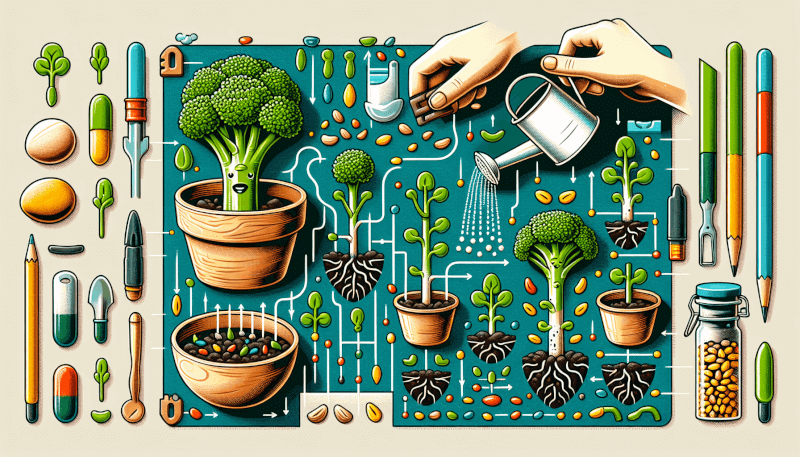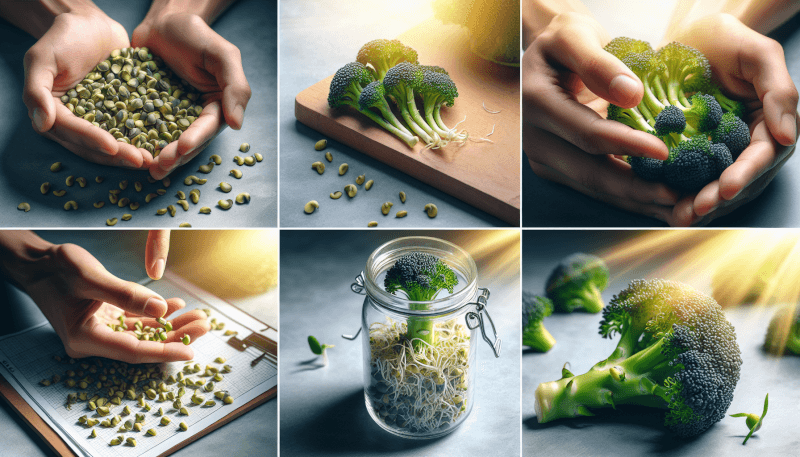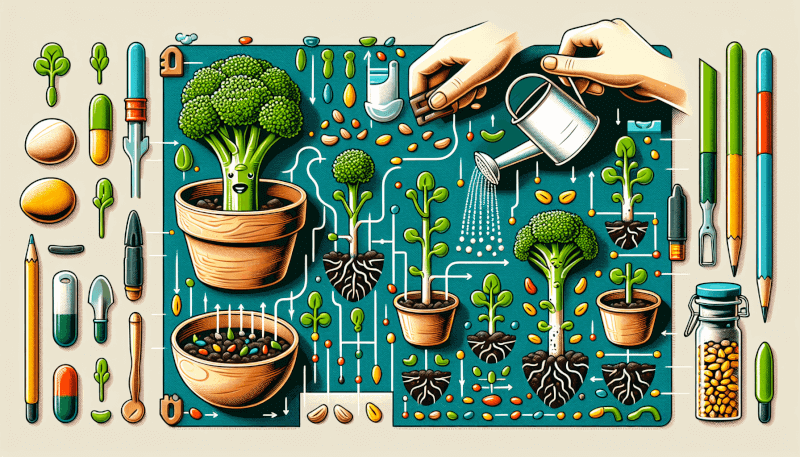If you’re looking for the perfect addition to your homegrown sprouts, look no further than sprouting broccoli seeds. Todd’s Seeds offers a wide variety of broccoli seeds that are ideal for sprouting at home or as microgreen sprouts. With the highest quality seeds, you can trust Todd’s Seeds to provide you with the best broccoli sprouts. Whether you’re a seasoned gardener or just starting out, sprouting broccoli seeds will surely enhance your sprouting experience. So, why wait? Start growing your own delicious and nutritious broccoli sprouts today!

Benefits of Sprouting Broccoli Seeds
Sprouting broccoli seeds can offer a myriad of benefits that can enhance your overall well-being. From their nutritional value to their health benefits, and even how easy they are to grow, sprouting broccoli seeds are definitely worth adding to your diet.
Nutritional Value
Broccoli sprouts are packed with essential nutrients that can provide a significant boost to your health. They contain high levels of vitamins A, C, and K, as well as minerals like potassium and magnesium. Moreover, broccoli sprouts are rich in antioxidants and fiber, which are important for supporting a healthy digestive system and reducing the risk of chronic diseases.
Health Benefits
The health benefits of sprouting broccoli seeds are truly remarkable. Research has shown that they have a higher concentration of sulforaphane compared to mature broccoli. Sulforaphane is a compound known for its potential anticancer properties and its ability to detoxify the body. Additionally, broccoli sprouts have been found to have anti-inflammatory effects, promote heart health, and support healthy brain function.
Easy to Grow
One of the best things about sprouting broccoli seeds is how easy they are to grow at home. You don’t need a large garden or extensive gardening experience to enjoy the benefits of homegrown sprouts. Sprouting broccoli seeds can be grown indoors in small containers or jars, making it accessible to almost anyone. Plus, the growing process is relatively quick, allowing you to harvest fresh sprouts in just a matter of days.
Choosing the Right Broccoli Seeds
To ensure successful sprouting and delicious sprouts, it is crucial to choose the right broccoli seeds. Here are two key considerations when selecting your seeds:
Organic vs. Chemical Free
When it comes to choosing your broccoli seeds, opt for chemical free seeds over organic seeds whenever possible. Most people think that organic seeds are grown without the use of synthetic pesticides or fertilizers, making them a healthier choice for your sprouts and the environment. Unfortunately, the USDA does allow the use of certain chemicals under certain conditions. If you want to know 100% that you are buying seeds that were never exposed to chemicals, even by exemption, buy chemical-free over organic. By choosing chemical free broccoli seeds, you can enjoy the peace of mind knowing that your sprouts are free from harmful chemicals, as chemical free seeds are grown to the same, if not stricter standards than organic.
Variety Selection
There are various broccoli seed varieties available, and your choice will depend on your personal preferences and intended use. Some popular choices include Calabrese, De Cicco, and Belstar varieties. Consider factors such as taste, texture, and growth characteristics when selecting your seeds. It’s also worth noting that different varieties may require specific growing conditions, so ensure you choose seeds suitable for your climate and growing setup. If, for health or other reasons, you want seed that contain the highest possible concentration of sulphoraphane, then choose Calabrese variety.
Preparing Seeds for Sprouting
Before you start the sprouting process, it’s important to prepare the seeds properly to maximize germination and yield healthy sprouts.
Cleaning and Soaking
Begin by thoroughly cleaning the broccoli seeds to remove any dust or debris. Rinse them in water and give them a gentle swirl to ensure they are clean. Once cleaned, soak the seeds in water for about 8-12 hours. This soaking process helps to rehydrate the seeds and kick-start the germination process.
Germination Process
After soaking, drain the water and transfer the seeds to a sprouting container. Ensure the container has proper drainage to prevent excess moisture. Spread the seeds evenly across the container, allowing them room to grow. Rinse the seeds with water at least twice a day to keep them moist and promote germination. Within a few days, you’ll start to see tiny sprouts emerging.

Growing Broccoli Sprouts at Home
Growing broccoli sprouts at home is a rewarding experience that can be easily accomplished with a few basic supplies. Here’s what you’ll need:
Equipment Needed
- Sprouting container or jar with a lid
- Water
- Broccoli seeds
- Sprouting lid or cheesecloth
- Tray or plate to catch excess water
- Light source (optional)
Step-by-Step Instructions
- Prepare your sprouting container or jar by thoroughly cleaning it, ensuring it is free from any residue or lingering odors.
- Add the desired amount of broccoli seeds to the container. Avoid overcrowding the seeds to allow proper air circulation and prevent mold growth.
- Rinse the seeds in the container, swirling them in water to remove any remaining debris.
- Drain the water from the container and cover it with a sprouting lid or cheesecloth. This will allow air circulation while preventing any insects or dust from entering.
- Place the container in a well-ventilated area away from direct sunlight. Alternatively, you can provide indirect light by placing it near a window.
- Rinse the seeds with water at least twice a day, ensuring they remain moist. Drain excess water and return the container to its designated spot.
- Within 3-5 days, your broccoli sprouts should be ready for harvest. Once they reach the desired length, harvest by cutting them just above the seeds.
- Rinse the sprouts thoroughly to remove any seed husks and enjoy them immediately or store them correctly for future use.
Caring for Broccoli Sprouts
Proper care is essential to ensure healthy growth and optimal yield of your broccoli sprouts. Consider the following factors when caring for your sprouts:
Watering Requirements
To maintain the moisture levels necessary for sprouting, rinse your sprouts with water at least twice a day. Ensure that excess water is drained thoroughly to avoid waterlogging, which can lead to mold growth. Remember, maintaining the right amount of moisture is crucial for the overall health and quality of your sprouts.
Temperature and Light Conditions
Broccoli sprouts thrive in a mild climate with temperatures between 60°F to 75°F (15°C to 24°C). Avoid exposing them to extreme heat or cold as it can negatively impact their growth. If your sprouts are grown indoors, provide them with indirect light or place them near a window where they can receive adequate sunlight. If natural light is limited, you can also use a grow light to supplement their light requirements.
Harvesting and Storing Broccoli Sprouts
Knowing the optimal time to harvest your broccoli sprouts and understanding the proper storage techniques are vital to maximize freshness and quality.
Optimal Harvest Time
Broccoli sprouts are typically ready for harvest within 3-5 days after germination. They should have reached a desirable length, usually around 1-3 inches. To harvest the sprouts, simply cut them just above the seeds. Avoid leaving any parts of the sprouts attached to the seeds, as they can affect the sprout’s overall quality.
Proper Storage Techniques
To extend the shelf life of your freshly harvested broccoli sprouts, proper storage is crucial. After rinsing, gently shake off any excess water and allow them to air dry on a clean towel or paper towel. Once dry, transfer the sprouts to an airtight container or a plastic bag with small holes to allow for proper airflow. Store the container in the refrigerator, ideally at temperatures between 36°F to 40°F (2°C to 4°C). Properly stored broccoli sprouts can stay fresh for up to 5-7 days.
Broccoli Sprouts and Their Culinary Uses
Broccoli sprouts can be a versatile addition to your daily meals, adding a fresh and flavorful twist to various dishes. Here are some popular culinary uses for broccoli sprouts:
Adding to Salads and Sandwiches
Toss a handful of broccoli sprouts into your salads or use them as a topping for sandwiches or wraps. Their crisp texture and nutty flavor can provide a delightful contrast to other ingredients, enhancing both the taste and nutritional value of your meal.
Incorporating into Stir-Fries and Smoothies
Broccoli sprouts can bring a vibrant burst of flavor to stir-fries and smoothies. Add them to your favorite stir-fry recipe during the last few minutes of cooking to preserve their crunchiness. When it comes to smoothies, blend a handful of sprouts with your choice of fruits and vegetables for a nutritious kick-start to your day.
Broccoli Sprouts as Microgreens
Broccoli sprouts also have the potential to be grown as microgreens, offering their own unique set of benefits.
Benefits of Growing as Microgreens
Microgreens are young, tender plants that are harvested before reaching full maturity. When grown as microgreens, broccoli sprouts are known to have even higher concentrations of vitamins and antioxidants compared to fully grown broccoli. Adding microgreens to your diet can provide a concentrated dose of nutrition in a small package.
Growing and Using Broccoli Microgreens
To grow broccoli microgreens, follow a similar process as sprouting broccoli seeds, but instead, let them grow for a longer period, usually around 7-14 days. Once they have developed their first true leaves, they are ready for harvest. Snip the greens just above the soil line and use them to garnish salads, soups, or even as a flavorful addition to sandwiches and wraps.
Additional Tips and Troubleshooting
While sprouting broccoli seeds is a relatively straightforward process, there may be some common issues or factors that can affect sprouting success. Here are a few additional tips and troubleshooting techniques to help you along the way:
Common Issues and Solutions
- Mold growth: Ensure proper drainage and ventilation to prevent excess moisture, which can lead to mold growth. Rinse the sprouts thoroughly and remove any discolored or slimy sprouts.
- Seed clumping: Avoid overcrowding the seeds in the sprouting container to promote better airflow and prevent seed clumping. This allows each seed to grow independently.
- Slow germination: Ensure proper soaking and drainage techniques. If necessary, try a different batch of seeds or adjust the room temperature to promote faster germination.
Factors Affecting Sprouting Success
Several factors can impact the success of your sprouting process:
- Quality of seeds: Purchase fresh, high-quality broccoli seeds from reputable sources to ensure better germination rates.
- Temperature and humidity: Maintain the right environment by controlling the temperature and humidity levels around your sprouting container.
- Water quality: Use clean, filtered water to rinse the seeds and avoid any potential contaminants that might hinder sprouting.
Safety Precautions
Ensuring food safety and avoiding contamination is vital to protect your health when sprouting broccoli seeds. Consider the following safety precautions:
Food Safety Considerations
- Cleanliness: Maintain a clean and sterile environment when handling broccoli seeds and sprouts. Regularly sanitize all equipment, containers, and utensils used in the sprouting process.
- Proper hygiene: Wash your hands thoroughly before handling seeds or sprouts to prevent cross-contamination.
- Seed quality: Only choose high-quality, organic broccoli seeds and avoid using seeds intended for planting in the garden.
Avoiding Contamination
- Rinse thoroughly: Rinse the seeds and sprouts under clean running water to remove any dirt, dust, or potential contaminants.
- Store correctly: Properly store your freshly harvested sprouts to prevent contamination from bacteria or mold.
- Consume promptly: Consume sprouts within their optimal freshness period to minimize the risk of bacterial growth.
By following these safety precautions, you can enjoy the delightful taste and numerous health benefits of sprouting broccoli seeds without compromising your well-being.
In conclusion, sprouting broccoli seeds can be a fantastic addition to your diet, providing a wealth of nutritional value and health benefits. With the right seeds, preparation techniques, and adequate care, you can grow your own fresh and delicious sprouts right in the comfort of your home. Experiment with different culinary uses and explore the world of microgreens to make the most out of your sprouting journey. Happy sprouting!
Order broccoli sprouting seeds bulk today!




